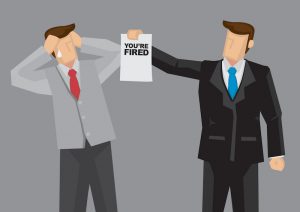 As part of our labor and employment practice, we routinely assist our business clients with unemployment benefits hearings in front of the Texas Workforce Commission (“TWC”). The core issue in these hearings is usually whether the former employee (claimant) is disqualified from receiving unemployment benefits. When the employer is opposing the claimant’s request for benefits, it is often because the employer has terminated the claimant “for cause”. Being terminated “for cause”, or for “good cause”, is a concept that many employers are familiar with, and it is a phrase that is commonly used in employment contracts and employee handbooks. However, interestingly, the Texas Workforce Commission’s decision will often hinge on a different word: Misconduct.
As part of our labor and employment practice, we routinely assist our business clients with unemployment benefits hearings in front of the Texas Workforce Commission (“TWC”). The core issue in these hearings is usually whether the former employee (claimant) is disqualified from receiving unemployment benefits. When the employer is opposing the claimant’s request for benefits, it is often because the employer has terminated the claimant “for cause”. Being terminated “for cause”, or for “good cause”, is a concept that many employers are familiar with, and it is a phrase that is commonly used in employment contracts and employee handbooks. However, interestingly, the Texas Workforce Commission’s decision will often hinge on a different word: Misconduct.
It is hugely important for employers to understand that “misconduct” is not the same thing as “cause”. Cause is generally understood to mean “for good reason”, but, practically speaking the word “cause” is defined differently in diverse scenarios. Misconduct, on the other hand, has a specific statutory definition in Texas. The TWC is going to rely heavily on the defined term “misconduct”. Accordingly, it is crucial for Texas employers to understand the concept of “misconduct” and advise their employees (in writing!) of the consequences of any “misconduct”.
“Misconduct” is officially defined in Section 201.012 of the Texas Labor Code as follows: “‘Misconduct’ means mismanagement of a position of employment by action or inaction, neglect that jeopardizes the life or property of another, intentional wrongdoing or malfeasance, intentional violation of a law, or violation of a policy or rule adopted to ensure the orderly work and the safety of employees”, but “does not include an act in response to an unconscionable act of an employer or superior.”
The TWC also comments that “’misconduct’ under the law of unemployment compensation is basically something that the claimant did or failed to do that 1) caused a problem for the company, 2) was in violation of a rule, a policy, or a law, and 3) was within the claimant’s power to control or avoid.”
The TWC provides some helpful and explicit advice on its website as well:
In any such case, you need to show two main things. First, you need to prove that the claimant was fired for a specific act of misconduct connected with the work that happened close in time to the discharge. Second, you must show how the claimant either knew or should have known he could be fired for such a reason. In the vast majority of cases, employers will need to prove these things with documentation and with firsthand testimony from witnesses who have direct, personal knowledge of the events in question. Following these suggestions should give you a much better chance of success in a case. Not following them, either avoidably or unavoidably, will make it much harder to defend against what you might consider an unjustified claim.
The most common mistakes employers make that cause difficulty in unemployment claims based upon a discharge are:
failing to give a final warning prior to discharge;
inconsistent discipline between two similarly-situated employees;
failing to follow the stated disciplinary policy;
telling TWC that the claimant was fired for an “accumulation” of incidents, instead of a specific final incident;
letting too much time pass between the final incident and the discharge;
telling TWC that the claimant was “unable” to satisfy performance standards;
allowing the impression that the discharge was really based upon a personality dispute; and
failing to present firsthand witnesses and proper documentation when needed.
See http://www.twc.state.tx.us/news/efte/ui_law_qualification_issues.html for the TWC comments above.
A focus on the concept of “misconduct” should benefit both employer and employee, and lend a little focus to an otherwise uncertain process.
The attorneys at De Leon & Washburn, P.C. are available to assist clients with commercial litigation, employment agreements, comprehensive arbitration, separation advice, and employment litigation. For more information regarding the firm’s services, please visit our Practice Areas page, and please feel free to contact the attorneys at any time.
© De Leon & Washburn, P.C. This article is provided for informational purposes only. It is not intended as legal advice nor does it create an attorney/client relationship between De Leon & Washburn, P.C. and any readers or recipients. Readers should consult counsel of their own choosing to discuss how these matters relate to their individual circumstances. Articles are not continuously updated, and De Leon & Washburn, P.C. makes no warranty or representation regarding accuracy or completeness.
